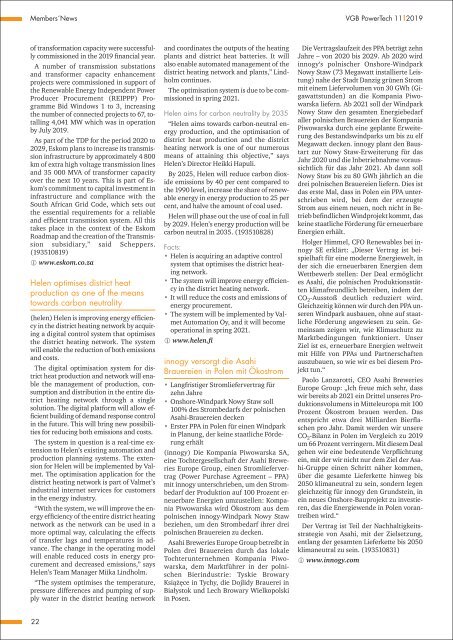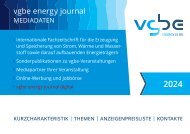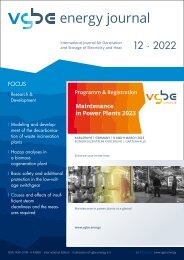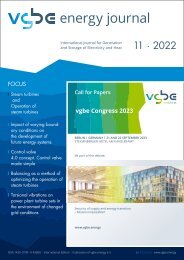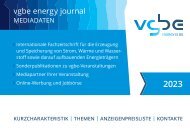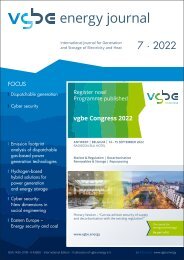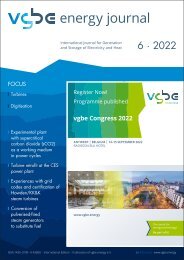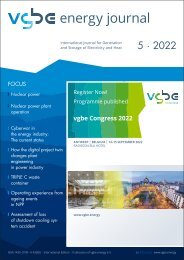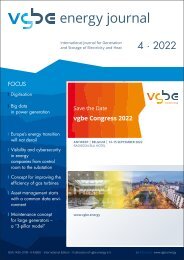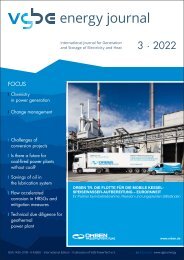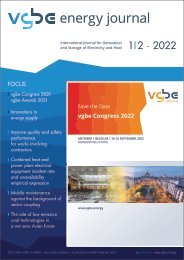VGB POWERTECH 11 (2019)
VGB PowerTech - International Journal for Generation and Storage of Electricity and Heat. Issue 11 (2019). Technical Journal of the VGB PowerTech Association. Energy is us! Power plant operation: legal & technology. Pumped hydro storage. Latent heat storages.
VGB PowerTech - International Journal for Generation and Storage of Electricity and Heat. Issue 11 (2019).
Technical Journal of the VGB PowerTech Association. Energy is us!
Power plant operation: legal & technology. Pumped hydro storage. Latent heat storages.
Create successful ePaper yourself
Turn your PDF publications into a flip-book with our unique Google optimized e-Paper software.
Members´News <strong>VGB</strong> PowerTech <strong>11</strong> l <strong>2019</strong><br />
of transformation capacity were successfully<br />
commissioned in the <strong>2019</strong> financial year.<br />
A number of transmission substations<br />
and transformer capacity enhancement<br />
projects were commissioned in support of<br />
the Renewable Energy Independent Power<br />
Producer Procurement (REIPPP) Programme<br />
Bid Windows 1 to 3, increasing<br />
the number of connected projects to 67, totalling<br />
4,041 MW which was in operation<br />
by July <strong>2019</strong>.<br />
As part of the TDP for the period 2020 to<br />
2029, Eskom plans to increase its transmission<br />
infrastructure by approximately 4 800<br />
km of extra high voltage transmission lines<br />
and 35 000 MVA of transformer capacity<br />
over the next 10 years. This is part of Eskom’s<br />
commitment to capital investment in<br />
infrastructure and compliance with the<br />
South African Grid Code, which sets out<br />
the essential requirements for a reliable<br />
and efficient transmission system. All this<br />
takes place in the context of the Eskom<br />
Roadmap and the creation of the Transmission<br />
subsidiary,” said Scheppers.<br />
(193510819)<br />
LLwww.eskom.co.za<br />
Helen optimises district heat<br />
production as one of the means<br />
towards carbon neutrality<br />
(helen) Helen is improving energy efficiency<br />
in the district heating network by acquiring<br />
a digital control system that optimises<br />
the district heating network. The system<br />
will enable the reduction of both emissions<br />
and costs.<br />
The digital optimisation system for district<br />
heat production and network will enable<br />
the management of production, consumption<br />
and distribution in the entire district<br />
heating network through a single<br />
solution. The digital platform will allow efficient<br />
building of demand response control<br />
in the future. This will bring new possibilities<br />
for reducing both emissions and costs.<br />
The system in question is a real-time extension<br />
to Helen’s existing automation and<br />
production planning systems. The extension<br />
for Helen will be implemented by Valmet.<br />
The optimisation application for the<br />
district heating network is part of Valmet’s<br />
industrial internet services for customers<br />
in the energy industry.<br />
“With the system, we will improve the energy<br />
efficiency of the entire district heating<br />
network as the network can be used in a<br />
more optimal way, calculating the effects<br />
of transfer lags and temperatures in advance.<br />
The change in the operating model<br />
will enable reduced costs in energy procurement<br />
and decreased emissions,” says<br />
Helen’s Team Manager Miika Lindholm.<br />
“The system optimises the temperature,<br />
pressure differences and pumping of supply<br />
water in the district heating network<br />
and coordinates the outputs of the heating<br />
plants and district heat batteries. It will<br />
also enable automated management of the<br />
district heating network and plants,” Lindholm<br />
continues.<br />
The optimisation system is due to be commissioned<br />
in spring 2021.<br />
Helen aims for carbon neutrality by 2035<br />
“Helen aims towards carbon-neutral energy<br />
production, and the optimisation of<br />
district heat production and the district<br />
heating network is one of our numerous<br />
means of attaining this objective,” says<br />
Helen’s Director Heikki Hapuli.<br />
By 2025, Helen will reduce carbon dioxide<br />
emissions by 40 per cent compared to<br />
the 1990 level, increase the share of renewable<br />
energy in energy production to 25 per<br />
cent, and halve the amount of coal used.<br />
Helen will phase out the use of coal in full<br />
by 2029. Helen’s energy production will be<br />
carbon neutral in 2035. (193510828)<br />
Facts:<br />
• Helen is acquiring an adaptive control<br />
system that optimises the district heating<br />
network.<br />
• The system will improve energy efficiency<br />
in the district heating network.<br />
• It will reduce the costs and emissions of<br />
energy procurement.<br />
• The system will be implemented by Valmet<br />
Automation Oy, and it will become<br />
operational in spring 2021.<br />
LLwww.helen.fi<br />
innogy versorgt die Asahi<br />
Brauereien in Polen mit Ökostrom<br />
• Langfristiger Stromliefervertrag für<br />
zehn Jahre<br />
• Onshore-Windpark Nowy Staw soll<br />
100% des Strombedarfs der polnischen<br />
Asahi-Brauereien decken<br />
• Erster PPA in Polen für einen Windpark<br />
in Planung, der keine staatliche Förderung<br />
erhält<br />
(innogy) Die Kompania Piwowarska SA,<br />
eine Tochtergesellschaft der Asahi Breweries<br />
Europe Group, einen Stromliefervertrag<br />
(Power Purchase Agreement – PPA)<br />
mit innogy unterschrieben, um den Strombedarf<br />
der Produktion auf 100 Prozent erneuerbare<br />
Energien umzustellen: Kompania<br />
Piwowarska wird Ökostrom aus dem<br />
polnischen innogy-Windpark Nowy Staw<br />
beziehen, um den Strombedarf ihrer drei<br />
polnischen Brauereien zu decken.<br />
Asahi Breweries Europe Group betreibt in<br />
Polen drei Brauereien durch das lokale<br />
Tochterunternehmen Kompania Piwowarska,<br />
dem Marktführer in der polnischen<br />
Bierindustrie: Tyskie Browary<br />
Książęce in Tychy, die Dojlidy Brauerei in<br />
Białystok und Lech Browary Wielkopolski<br />
in Posen.<br />
Die Vertragslaufzeit des PPA beträgt zehn<br />
Jahre – von 2020 bis 2029. Ab 2020 wird<br />
innogy‘s polnischer Onshore-Windpark<br />
Nowy Staw (73 Megawatt installierte Leistung)<br />
nahe der Stadt Danzig grünen Strom<br />
mit einem Liefervolumen von 30 GWh (Gigawattstunden)<br />
an die Kompania Piwowarska<br />
liefern. Ab 2021 soll der Windpark<br />
Nowy Staw den gesamten Energiebedarf<br />
aller polnischen Brauereien der Kompania<br />
Piwowarska durch eine geplante Erweiterung<br />
des Bestandswindparks um bis zu elf<br />
Megawatt decken. innogy plant den Baustart<br />
zur Nowy Staw-Erweiterung für das<br />
Jahr 2020 und die Inbetriebnahme voraussichtlich<br />
für das Jahr 2021. Ab dann soll<br />
Nowy Staw bis zu 80 GWh jährlich an die<br />
drei polnischen Brauereien liefern. Dies ist<br />
das erste Mal, dass in Polen ein PPA unterschrieben<br />
wird, bei dem der erzeugte<br />
Strom aus einem neuen, noch nicht in Betrieb<br />
befindlichen Windprojekt kommt, das<br />
keine staatliche Förderung für erneuerbare<br />
Energien erhält.<br />
Holger Himmel, CFO Renewables bei innogy<br />
SE erklärt: „Dieser Vertrag ist beispielhaft<br />
für eine moderne Energiewelt, in<br />
der sich die erneuerbaren Energien dem<br />
Wettbewerb stellen: Der Deal ermöglicht<br />
es Asahi, die polnischen Produktionsstätten<br />
klimafreundlich betreiben, indem der<br />
CO 2 -Ausstoß deutlich reduziert wird.<br />
Gleichzeitig können wir durch den PPA unseren<br />
Windpark ausbauen, ohne auf staatliche<br />
Förderung angewiesen zu sein. Gemeinsam<br />
zeigen wir, wie Klimaschutz zu<br />
Marktbedingungen funktioniert. Unser<br />
Ziel ist es, erneuerbare Energien weltweit<br />
mit Hilfe von PPAs und Partnerschaften<br />
auszubauen, so wie wir es bei diesem Projekt<br />
tun.“<br />
Paolo Lanzarotti, CEO Asahi Breweries<br />
Europe Group: „Ich freue mich sehr, dass<br />
wir bereits ab 2021 ein Drittel unseres Produktionsvolumens<br />
in Mitteleuropa mit 100<br />
Prozent Ökostrom brauen werden. Das<br />
entspricht etwa drei Milliarden Bierflaschen<br />
pro Jahr. Damit werden wir unsere<br />
CO 2 -Bilanz in Polen im Vergleich zu <strong>2019</strong><br />
um 66 Prozent verringern. Mit diesem Deal<br />
gehen wir eine bedeutende Verpflichtung<br />
ein, mit der wir nicht nur dem Ziel der Asahi-Gruppe<br />
einen Schritt näher kommen,<br />
über die gesamte Lieferkette hinweg bis<br />
2050 klimaneutral zu sein, sondern legen<br />
gleichzeitig für innogy den Grundstein, in<br />
ein neues Onshore-Bauprojekt zu investieren,<br />
das die Energiewende in Polen vorantreiben<br />
wird.“<br />
Der Vertrag ist Teil der Nachhaltigkeitsstrategie<br />
von Asahi, mit der Zielsetzung,<br />
entlang der gesamten Lieferkette bis 2050<br />
klimaneutral zu sein. (193510831)<br />
LLwww.innogy.com<br />
22


